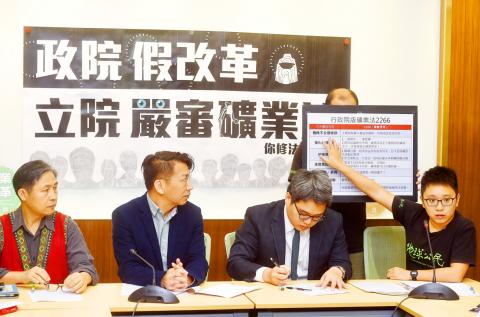Environmental groups yesterday called on members of the legislature’s Economics Committee to rework the draft amendments to the Mining Act (礦業法) to prevent mining corporations from exploiting Aboriginal property.
While many lawmakers proposed their drafts in previous legislative sessions, the Executive Yuan published its draft on Dec. 7, sparking criticism from many lawmakers and environmentalists over its content.
The Cabinet’s draft is more regressive than the one proposed in July by the Bureau of Mines, Citizen of the Earth, Taiwan consultant Tsai Chung-yueh (蔡中岳) told a news conference before the meeting, adding that Democratic Progressive Party (DPP) lawmakers are allegedly planning to rush it through.

Photo: Chien Jung-fong, Taipei Times
Regarding Article 13, the Cabinet proposed that miners applying for mining permit extensions should undergo a new environmental impact assessment conducted by the Environmental Protection Administration (EPA).
However, the draft does not require miners to stop their operations during the assessment, New Power Party Legislator Hsu Yung-ming (徐永明) said, adding that the Ministry of Economic Affairs is the agency that determines whether a mining project can be extended.
The EPA has been reduced to a subsidiary of the ministry, which would be given unduly administrative power to make decisions about mining projects, he said.
The act should not cater to the needs of Asia Cement Corp, Hsu said, urging lawmakers who have received donations from cement makers to withdraw from the review to avoid conflicts of interest.
The Cabinet proposed a new article, 43-2, that would require miners applying for a permit extension to observe the Indigenous Peoples Basic Act (原住民族基本法) by submitting documents to prove that local Aborigines have agreed to or joined their project.
However, this would mean that their approval is not necessary, Citizen of the Earth, Taiwan researcher Huang Ching-ting (黃靖庭) said.
The government only respects Aborigines when it needs them to perform in big events, but as for their rights to land and natural resources, it can find all kinds of excuses to exploit their property, Legal Aid Foundation lawyer Hsieh Meng-yu (謝孟羽) said.
Regulations regarding Aborigines’ approval and the extension of mining permits were among the most hotly debated subjects during the meeting.
As lawmakers could not reach consensus about many articles, DPP Legislator Chiu Chih-wei (邱志偉), the committee convener, said that the review is to continue tomorrow and on Thursday if necessary.

The Grand Hotel Taipei on Saturday confirmed that its information system had been illegally accessed and expressed its deepest apologies for the concern it has caused its customers, adding that the issue is being investigated by the Ministry of Justice Investigation Bureau. The hotel said that on Tuesday last week, it had discovered an external illegal intrusion into its information system. An initial digital forensic investigation confirmed that parts of the system had been accessed, it said, adding that the possibility that some customer data were stolen and leaked could not be ruled out. The actual scope and content of the affected data

DO THEY BITE IT? Cats have better memories than people might think, but their motivation is based entirely around the chance of getting fed Cats can remember the identity of the people who fed them the day before, Taipei-based veterinarians said on Friday, debunking a popular myth that cats have a short memory. If a stray does not recognize the person who fed them the previous day, it is likely because they are not carrying food and the cat has no reason to recognize them, said Wu Chou Animal Hospital head Chen Chen-huan (陳震寰). “When cats come to a human bearing food, it is coming for the food, not the person,” he said. “The food is the key.” Since the cat’s attention is on the food, it

A New York-based NGO has launched a global initiative to rename the nation’s overseas missions, most of which operate under the name "Taipei," to "Taiwan Representative Office (TRO)," according to a news release. Ming Chiang (江明信), CEO of Hello Taiwan, announced the campaign at a news conference in Berlin on Monday, coinciding with the World Forum held from Monday through Wednesday, the institution stated in the release. Speaking at the event, Democratic Progressive Party Legislator Huang Jie (黃捷) said she believed this renaming campaign would enable the international community to see Taiwan

TOO DANGEROUS: The families agreed to suspend crewed recovery efforts that could put rescuers in danger from volcanic gases and unstable terrain The bodies of two Taiwanese tourists and a Japanese pilot have been located inside a volcanic crater, Japanese authorities said yesterday, nearly a month after a sightseeing helicopter crashed during a flight over southwestern Japan. Drone footage taken at the site showed three bodies near the wreckage of the aircraft inside a crater on Mount Aso in Kumamoto Prefecture, police and fire officials said. The helicopter went missing on Jan. 20 and was later found on a steep slope inside the Nakadake No. 1 Crater, about 50m below the rim. Authorities said that conditions at the site made survival highly unlikely, and ruled